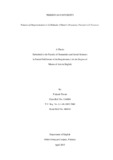Please use this identifier to cite or link to this item:
https://elibrary.tucl.edu.np/handle/123456789/3314| Title: | Patriarchal Representation in Lil Bahadur Chhetri's Mountains Painted with Turmeric |
| Authors: | Tiwari, Prakash |
| Keywords: | Lil Bahadur Chhetri's;Feminism and Female;Patriarchal Society;English novel;Maina and Jhuma |
| Issue Date: | Apr-2015 |
| Citation: | Faculty of Humanities and Social Sciences Department of English, P. N. Campus |
| Abstract: | In the patriarchal-feudal social scenario depicted in Chhetri’s Mountains Painted with Turmeric, women are subjected to control and domination. Such control and domination is sustained through the construction of such binaries: masculinity/femininity, reason/emotion, culture/nature, superior/inferior, subject/object, self/other, man/land, feudal/ serfs and so on. Women like Maina and Jhuma do not have access to land, property and decision-making, so they are controlled and dominated by male intervention. They are treated as commodity to be possessed and as instruments to carry out male purposes. Their condition is totally controlled by patriarchal norms and values, thereby being confined into domesticity occupying a subordinate position to men. Such oppression of woman operates under the ideological principle of patriarchal masculinity that seeks to control and dominate women.. Therefore, females like Maina and Jhuma are not only stereotypically represented but also hegemonically subordinated. The patriarchal ideology is inflicted upon them in such a way that they are rendered completely helpless and submissive. |
| URI: | http://elibrary.tucl.edu.np/handle/123456789/3314 |
| Appears in Collections: | English |
Files in This Item:
| File | Description | Size | Format | |
|---|---|---|---|---|
| 12124 pdf.pdf | 511.22 kB | Adobe PDF |  View/Open |
Items in DSpace are protected by copyright, with all rights reserved, unless otherwise indicated.
